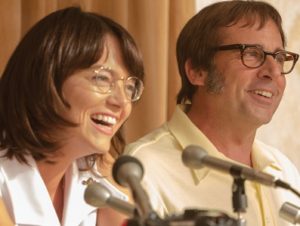Battle of the Sexes
 In 1973, loud-mouthed, boorish, self-proclaimed male chauvinist pig Bobby Riggs challenged women’s tennis champ Billie Jean King to a match. His goal was to prove that an over-the-hill male star could beat a woman in the prime of her career. Turned off by the hype, King refused, and Riggs subsequently defeated Australian Margaret Court. His gloating and churlishness prodded King to accept something she never thought she’d do – play a match against Riggs on national television.
In 1973, loud-mouthed, boorish, self-proclaimed male chauvinist pig Bobby Riggs challenged women’s tennis champ Billie Jean King to a match. His goal was to prove that an over-the-hill male star could beat a woman in the prime of her career. Turned off by the hype, King refused, and Riggs subsequently defeated Australian Margaret Court. His gloating and churlishness prodded King to accept something she never thought she’d do – play a match against Riggs on national television.
Even the title is “safe”
What became known as the Battle of the Sexes is the subject of Jonathan Dayton and Valerie Faris’ new film, appropriately (if guardedly) called “Battle of the Sexes.” And much as with the title itself, Simon Beaufoy’s screenplay plays it safe – from the first scene to the closing credits. That’s a shame, considering the gravity of the material.
Perfect casting
 Kudos to Dayton and Faris for enticing Steve Carrell to play Riggs. If there’s anybody alive who can perfectly embody the sheer obnoxiousness of Riggs, it’s Carrell. He was practically born to play this role. Emma Stone plays the serious, reserved King – the antithesis to Carrell’s bombastic Riggs. In a pleasantly restrained performance, comedienne Sarah Silverman is Gladys Heldman, the founder of World Tennis magazine, and a huge promoter of women’s tennis. Bill Pullman is the smarmy former champ and current tennis announcer Jack Kramer. And Elizabeth Shue plays the thankless role of Riggs’ long-suffering wife.
Kudos to Dayton and Faris for enticing Steve Carrell to play Riggs. If there’s anybody alive who can perfectly embody the sheer obnoxiousness of Riggs, it’s Carrell. He was practically born to play this role. Emma Stone plays the serious, reserved King – the antithesis to Carrell’s bombastic Riggs. In a pleasantly restrained performance, comedienne Sarah Silverman is Gladys Heldman, the founder of World Tennis magazine, and a huge promoter of women’s tennis. Bill Pullman is the smarmy former champ and current tennis announcer Jack Kramer. And Elizabeth Shue plays the thankless role of Riggs’ long-suffering wife.
Screenplay takes one risk
The best supporting turns come from Andrea Riseborough as King’s hairdresser and lover, and Austin Stowell as King’s biggest fan and exceedingly understanding husband. The subject of King’s bisexuality didn’t need to be broached in “Battle of the Sexes,” but it is a part of her life which she first discovered around the same time period. So while there’s no reason to include it, I’m glad screenwriter Beaufoy took the opportunity to do so. LGBT rights were essentially non-existent in 1973, and King knew her relationship had to remain invisible to the public.
Riggs is played for laughs
Where I think Beaufoy plays it too safely is with his depiction of Riggs. Yes, he was a showman, a gambler, and an incessant narcissist. But his chauvinism is played for laughs. I guess I expected a certain level of comedy, as directors Dayton and Faris gave us the 2008 comedy classic “Little Miss Sunshine.” But there needs to come a time when we realize people like Bobby Riggs (and to a lesser extent Jack Kramer) were downright dangerous to gender equality. I don’t feel like “Battle of the Sexes” ever gives the inequality of the times the heft it deserves. We see Riggs as a buffoon, but not as a threat; an annoyance, but not a peril.
Societal sexism
In fact, the latent gender discrimination of the times manifests itself most clearly in the stock footage of Howard Cosell calling the match. He doesn’t necessarily utter any biased lines, but the tenor in his voice – and the acceptance of a man whose athletic prime occurred in the 1940s as the equal of one of the greatest athletes on the planet, merely due to his gender – exemplifies the societal and foundational bigotry of the era.
Entertaining picture
 On the whole, “Battle of the Sexes” is a very entertaining film. Audiences will love King’s workmanlike attitude toward Riggs’ bloated self-importance. There are some funny lines. But my fear is that viewers too young to remember the actual match will come away with a sense that the outcome was meaningless. That the whole affair was nothing more than a circus sideshow, designed to take our minds off Viet Nam and Watergate for one night.
On the whole, “Battle of the Sexes” is a very entertaining film. Audiences will love King’s workmanlike attitude toward Riggs’ bloated self-importance. There are some funny lines. But my fear is that viewers too young to remember the actual match will come away with a sense that the outcome was meaningless. That the whole affair was nothing more than a circus sideshow, designed to take our minds off Viet Nam and Watergate for one night.
Important match for women
And that’s simply inaccurate. Coming just one year after Congress passed (and President Nixon signed) the landmark Title IX legislation – which opened up high school sports to girls – this match carried the weight of gender parity on its shoulders. And King knew it. No, she did not want to lower herself to Riggs’ level. But she knew she had to. Someone – some female – had to shut up the loudmouth once and for all. King was the best, so she reluctantly volunteered.
Decent effort
“Battle of the Sexes” does a good job of capturing the (often unintentional) sexism of the times, while giving us some laughs along the way. I wish the importance of the match had been given the significance it deserves, but on the whole, this is a decent effort. Your serve now, Mr. Riggs.
Andy Ray’s reviews also appear on http://youarecurrent.com/category/nightandday/
and he serves as a film historian for http://thefilmyap.com/